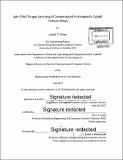Spin-orbit torque switching of compensated ferrimagnetic cobalt-terbium alloys
Author(s)
Finley, Joseph T. (Joseph Tyler)
DownloadFull printable version (4.696Mb)
Other Contributors
Massachusetts Institute of Technology. Department of Electrical Engineering and Computer Science.
Advisor
Marc A. Baldo.
Terms of use
Metadata
Show full item recordAbstract
Spintronic devices promise to be an energy efficient alternative to complementary metal oxide semiconductor devices for logic and memory. However, in order to be more competitive, further reductions in switching energy and switching speed are needed. Recently, there has been interest in using antiferromagnetically coupled materials instead of ferromagnetic materials to store information. Compared with ferromagnetic materials, antiferromagnetically coupled systems exhibit faster dynamics and are more stable against external magnetic field perturbations, which could potentially enable spintronic devices with higher speed and density. Despite the potential advantages of information storage in antiferromagnetically coupled materials, it remains uncertain whether one can efficiently control the magnetic state because of the cancelled net magnetic moment. This thesis reports spin-orbit torque induced magnetization switching of ferrimagnetic Co₁-xTbx thin films with perpendicular magnetic anisotropy. By varying the relative concentrations of the two atomic species, one can reach compensation points where the net magnetic moment or angular momentum goes to zero. We demonstrate current induced switching in all of the studied film compositions, including those near the magnetization compensation point. We then quantify the spin-orbit torque induced effective field, where we find that close to the compensation point, there is a divergent behavior that scales with the inverse of the magnetization, consistent with angular momentum conservation. The large effective spin-orbit torque, previously demonstrated fast dynamics, and small net magnetization in these ferrimagnetic systems promise spintronic devices that are faster and more scalable than traditional ferromagnetic systems.
Description
Thesis: S.M., Massachusetts Institute of Technology, Department of Electrical Engineering and Computer Science, 2017. Cataloged from PDF version of thesis. Includes bibliographical references (pages 51-54).
Date issued
2017Department
Massachusetts Institute of Technology. Department of Electrical Engineering and Computer SciencePublisher
Massachusetts Institute of Technology
Keywords
Electrical Engineering and Computer Science.